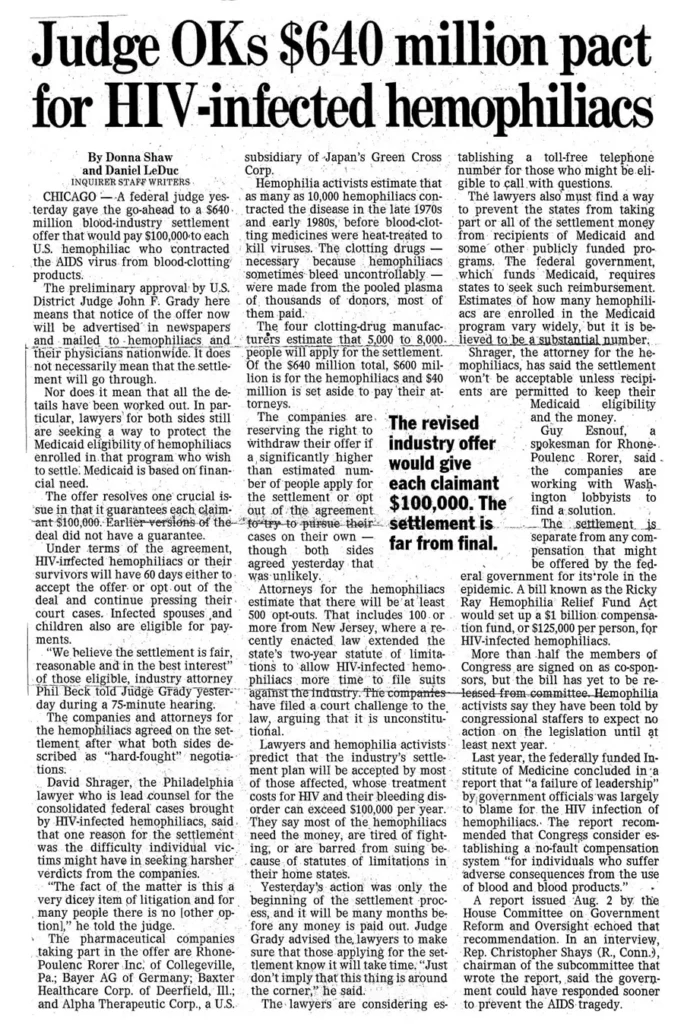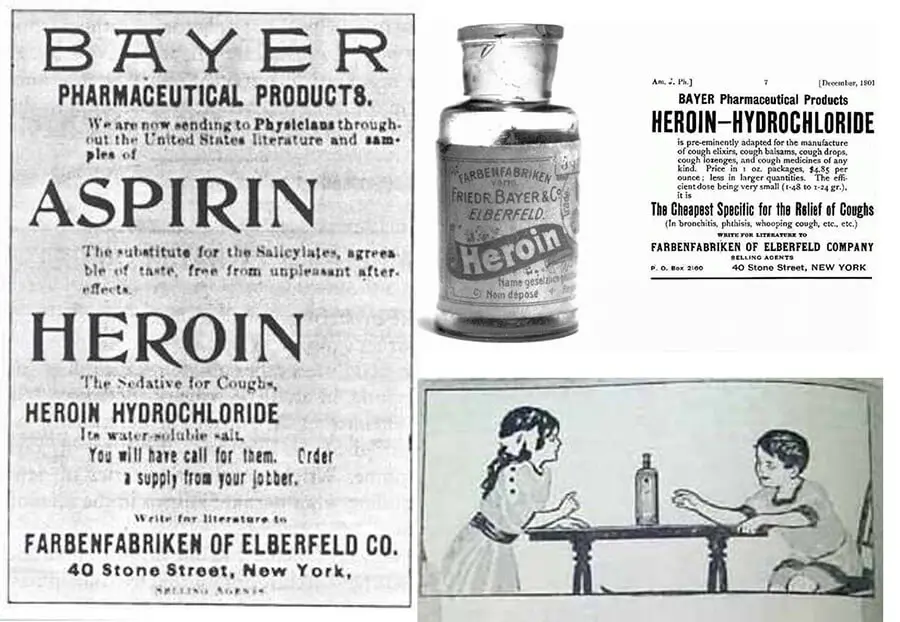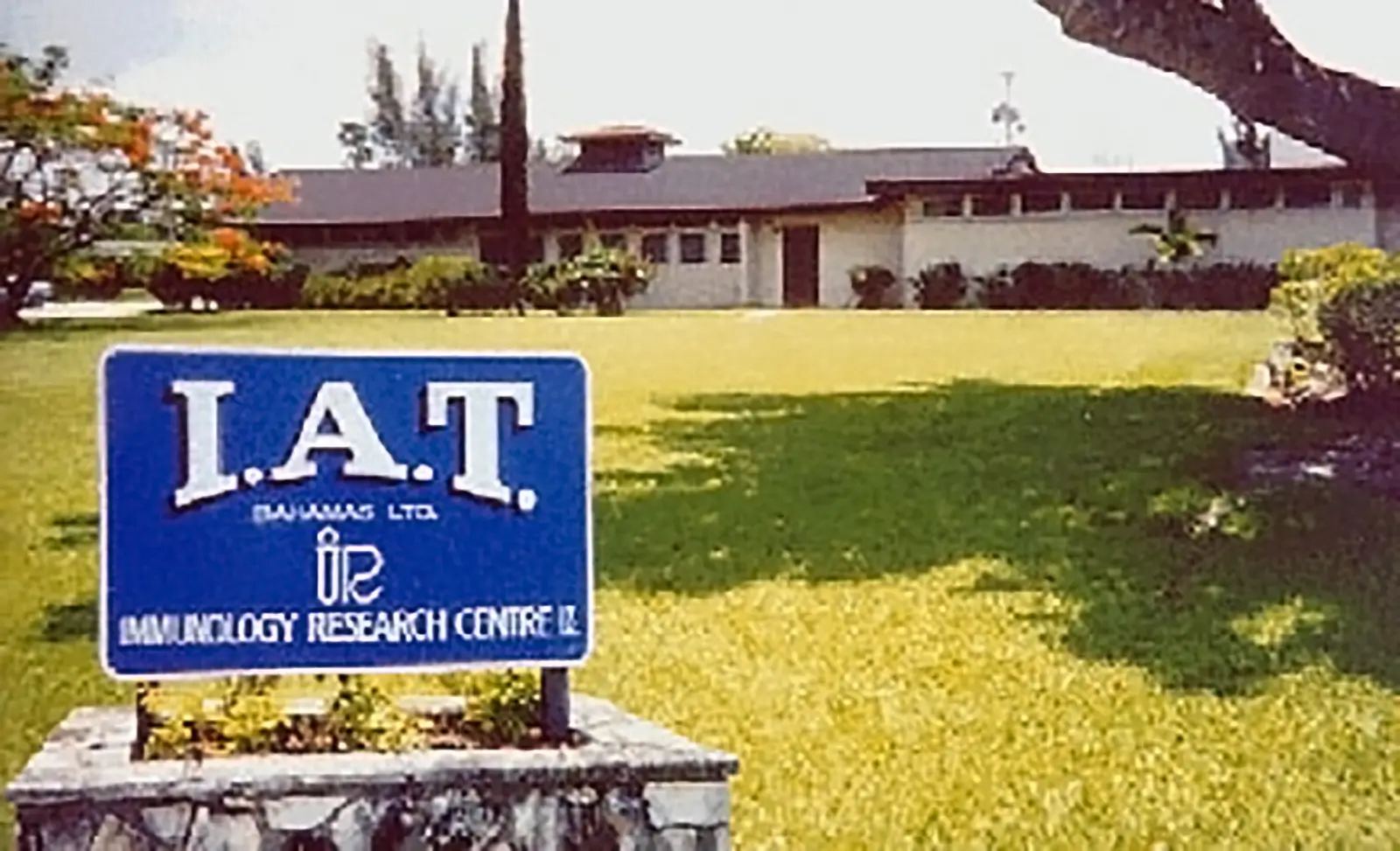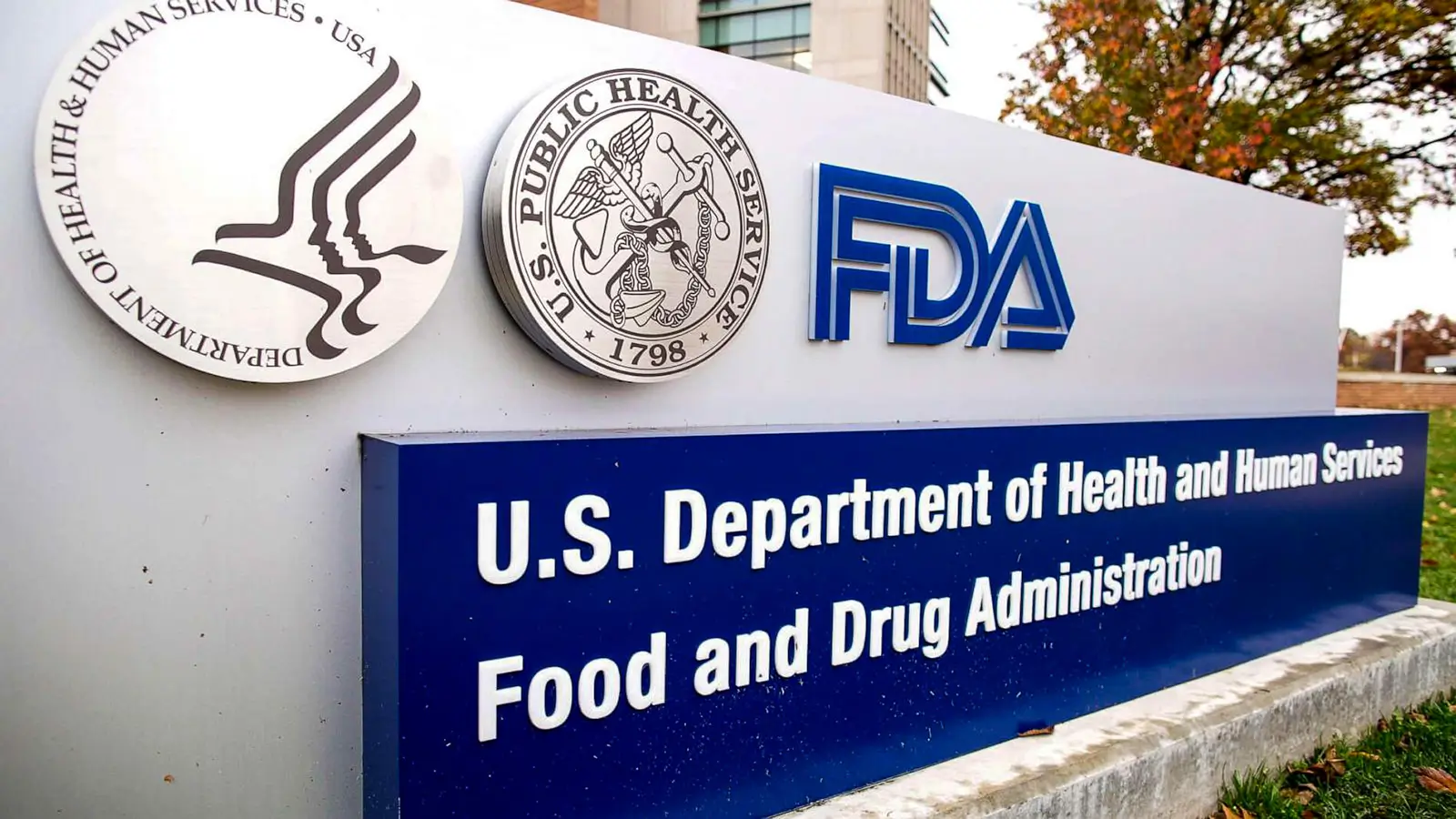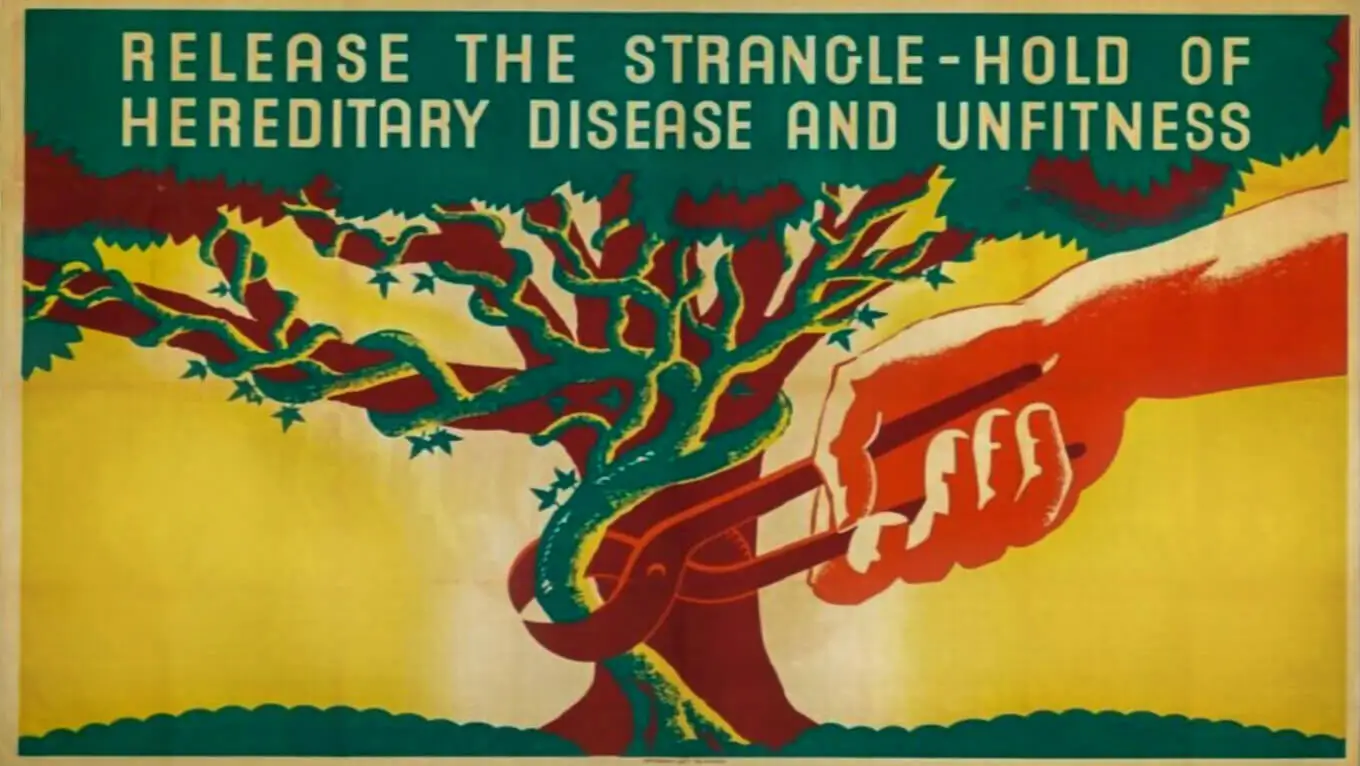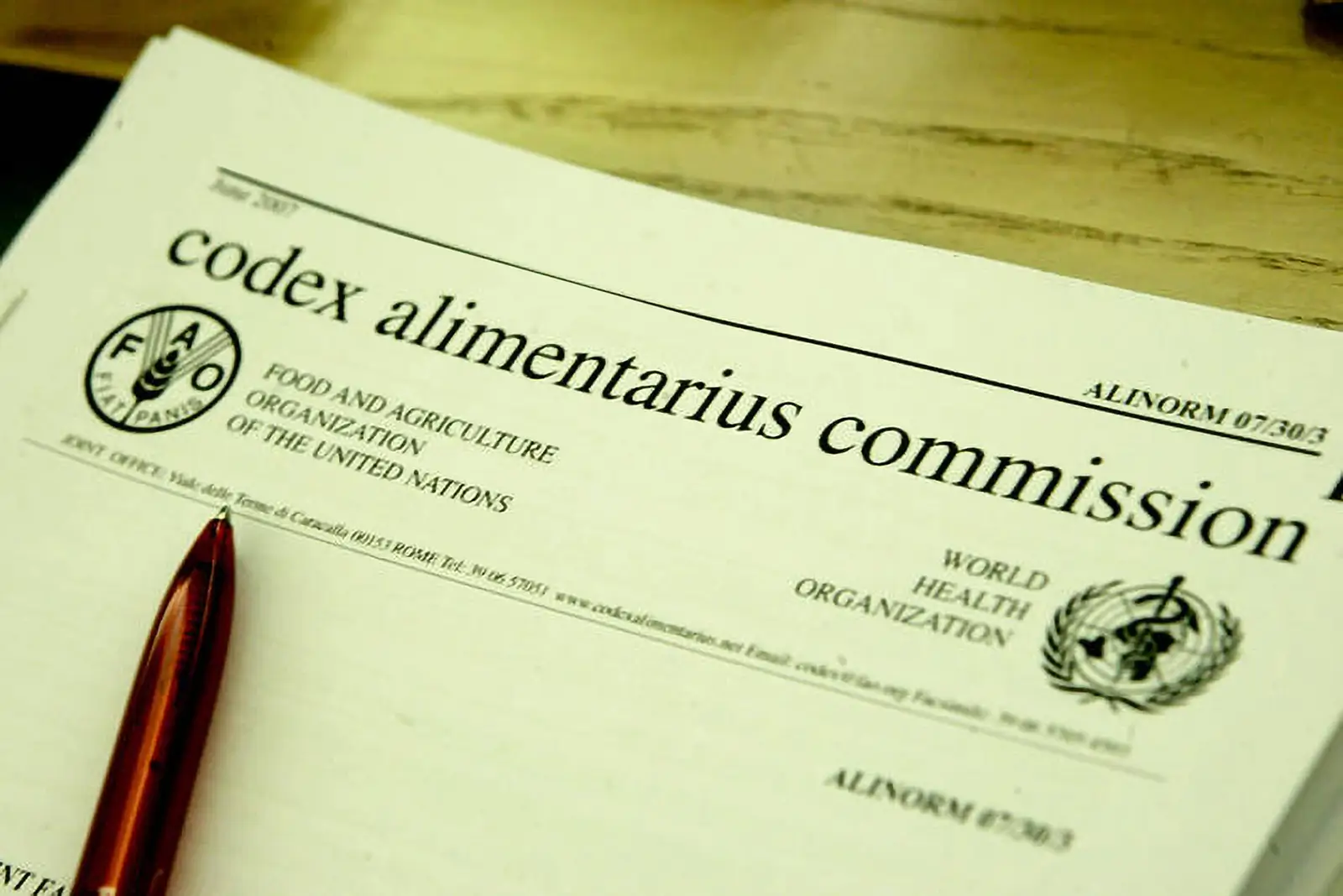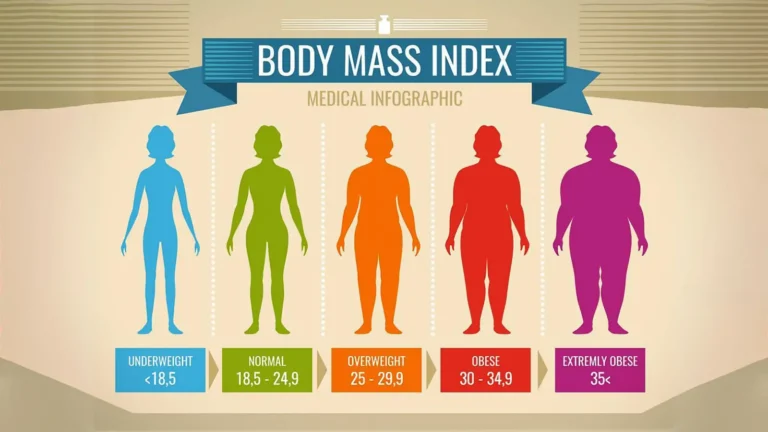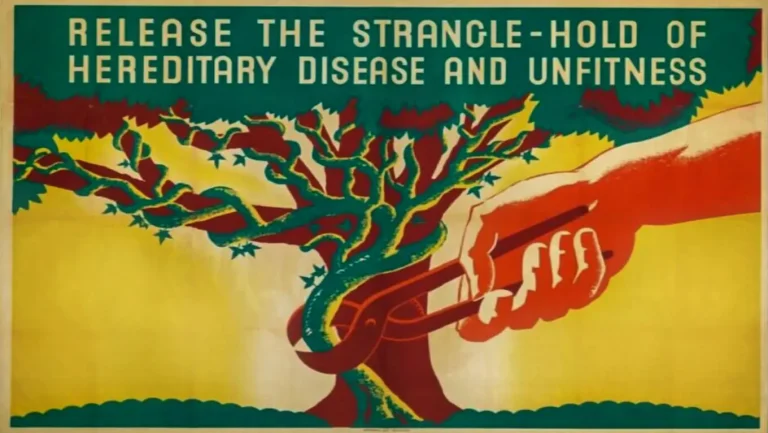The Tale of Big Pharma- Bayer (IG Farben), FDA and the AIDS virus
Bayer paid hundreds of millions of dollars to end a three-decade-long scandal in which the company sold HIV-contaminated blood to hemophiliacs, thousands of whom later died of AIDS.
Milos Pokimica
Written By: Milos Pokimica
Medically Reviewed by: Dr. Xiùying Wáng, M.D.
Updated August 4, 2023Nutritional science explained all of the connections between diseases of affluence and animal food consumption decades ago. Most of our number one killers are preventable but there is no interest in changing the current line of business. All of the available science will be kept out of the public and in reality, it does not matter.
What most people are aware of is just propaganda. Doctors are good, they have to pledge a Hippocratic oath, there are there to heal you and help you, and of course one day medicine is going to deliver us from all diseases. Usually, when people are confronted with the real history behind big pharma and realize the truth that government itself has a network for suppressing the science and that individual men’s interest is not its primary goal, they usually say that it is all in the past. Today we have more democracy and freedoms with better governmental control and so on.
The answer is no. We have even fewer freedoms than after WW2. We have been brainwashed in schools and by the media infused with psychological research for social control, but nothing else is different. The same structure exists and has been existing from not just middle age but even before that.
I will give one more recent example. You’d probably never know that Bayer (IG Farben) paid “tens of millions” of dollars to end a three-decade-long scandal in which the company sold HIV-contaminated blood products to hemophiliacs, thousands of whom later died of AIDS. Bayer is eventually forced into signing checks to individuals that acquired AIDS because, in the 1980s, the Cutter Biological section of Bayer neglected federal law and recruited gay men with high risk and intravenous drug users, and prisoners as donors of the blood that Cutter later used to produce Factor VIII and IX. It is a drug, the clotting product, that hemophiliacs need in order to not bleed to death. In 1997 Bayer was sentenced to pay 600 million into a compensation fund for hemophiliacs with HIV. About 20,000 individuals caught HIV from the blood.
Ironically, Bayer’s new hemophilia iPhone app got some coverage, as did Bayer’s hemophilia research grant to the University of Florida.
On July 16, 1982, the United States Centers for Disease Control and Prevention (CDC) suggested that three hemophiliacs had acquired AIDS. Epidemiologists began to think that the virus was spreading through hemophiliac medication that they inject once every week. Medication was made from large pools of donated plasma from different people. Much of which was collected before mandatory HIV testing, often from homosexuals and drug users and in some prisons. Without an infection test, they had no way to determine does the plasma donors carried the virus. In January 1983, the manager of Bayer’s Cutter Biological department confirmed in a letter that:
“There is strong evidence to suggest that AIDS is passed on to other people through … plasma products.”
These letters surfaced in trials and were found by some of the investigative journalists that later broke the story public. By May 1983, a Cutter competitor started producing a heat-treated concentrate that killed the virus, so France for example, and many other countries decided to halt all clotting concentrate imports. Cutter worried about losing consumers, so according to an enclosed memo: “want to give the impression that we continue improving our product without telling them that soon we were also going to have a heat-treated” concentrate. By June 1983, a Cutter letter to distributors to 20 countries said that:
“AIDS has become the center of irrational response in many countries” and that “This is of particular concern to us because of unsubstantiated speculations that certain blood products may transmit this syndrome.”
They lied, and many countries were still using an old concentrate. In February 1984, Cutter became the last of the four major blood product companies to get US approval to sell heated concentrate. They waited as long as possible. Still even after Cutter started to sell the new product, still for several more months, they continued making the old medicine. The reason was that the corporation had several fixed-price contracts and thought that the old product would be cheaper to produce. Bayer officials (responding on behalf of Cutter) responded with another lie: “because some customers doubted the new drug’s effectiveness,” some nations were slow to support registration of the new drug. Then they lied by telling that they had a shortage of plasma, which is used to make the medicine. For example, Taiwan was one country that still received the old HIV-infected drug. Hsu Chien-wen, an official at Taiwan’s health department, told in 2003 that Cutter had not appealed for approval to sell the heated medicine until July 1985. That was for an entire year and a half after doing so in the United States. In Hong Kong, for example, Cutter did not even need approval but only an import license in the 1980s to be able to import and sell the newer product in which normally takes one week. A company meeting notes that:
“There is excess inventory,”
that, in reality, produced the company resolving to:
“Review international markets again to determine if more of this product can be sold.”
Because of the lack of control and corruption Cutter decided to dispose of stockpiles of older HIV-positive drugs to third world countries while selling the new, safer product in the West. If some of the people catch AIDS well, they can take Aspirin for pain. And of course, there are all third world countries, so it is going to go well with eugenic programs of depopulation of the planet. When hemophiliacs in Hong Kong all of the sudden start to test positive for HIV, local physicians raised the question of whether Cutter was dumping “AIDS tainted” medicine into less-developed countries. Cutter rejected the accusation, insisting that older drug had “no severe hazard risk” and was, in fact, the “same fine product we have supplied for years.” Hong Kong did not believe the lie, and when the local distributor asked for the newer product, Cutter responded that all of the new product was going to the US and Europe. For Hong Kong, and other third-world countries they could make an exception for a small amount for the “most vocal patients.” Meaning influential people that could potentially make a problem for them. So if you are a son of a politician, they will give you new safe stuff.
The United States Food and Drug Administration helped to keep the news out of the public eye. Government is not there to protect you and never had been. In May 1985, the FDA’s regulator of blood products, Harry M. Meyer Jr., considering the companies had violated a voluntary arrangement to remove the old drug from the market, called directors of the corporations and directed them to comply. Cutter’s internal notes from their meeting show that Meyer required that the issue is:
“Quietly solved without alerting the Congress, the medical community and the public”
also noted that the FDA wanted the matter solved “quickly and quietly.” Also at that time, Cutter official wrote that:
“It appears there are no longer any markets in the Far East where we can expect to sell substantial quantities of nonheated-treated medicine.”
They sell AIDS-tainted medicine as long as possible with no empathy. The effects of all of this are impossible to calculate because there was no test for HIV, so we do not know how many people were infected with HIV before Cutter began selling its safer medicine or afterward. Cutter also sold the old medicine in Argentina, Indonesia, Japan, Malaysia, and Singapore after February 1984. Cutter shipped more than 100,000 vials of unheated concentrate, worth more than $4 million after it began selling the safer product. The sales continued partly because of Cutter’s desire to deplete stocks of the older medicine, and partly because of fixed-price contracts, for which the company believed the older product would be cheaper to make. U.S. Justice Department had never investigated any corporate executives. Bayer in the past even marketed heroin for children. That is the level of psychopathic nature of these people.
References:
Passages selected from a book: Pokimica, Milos. Go Vegan? Review of Science Part 2. Kindle ed., Amazon, 2018.
- McHenry L, Khoshnood M. Blood money: Bayer’s inventory of HIV-contaminated blood products and third world hemophiliacs. Account Res. 2014;21(6):389-400. doi: 10.1080/08989621.2014.882780. PMID: 24785997.
- Josefson D. Haemophilia patients launch action against Bayer over contaminated blood products. BMJ. 2003 Jun 14;326(7402):1286. doi: 10.1136/bmj.326.7402.1286-g. PMID: 12805147; PMCID: PMC1151015.
Related Posts
Do you have any questions about nutrition and health?
I would love to hear from you and answer them in my next post. I appreciate your input and opinion and I look forward to hearing from you soon. I also invite you to follow us on Facebook, Instagram, and Pinterest for more diet, nutrition, and health content. You can leave a comment there and connect with other health enthusiasts, share your tips and experiences, and get support and encouragement from our team and community.
I hope that this post was informative and enjoyable for you and that you are prepared to apply the insights you learned. If you found this post helpful, please share it with your friends and family who might also benefit from it. You never know who might need some guidance and support on their health journey.
– You Might Also Like –

Learn About Nutrition
Milos Pokimica is a doctor of natural medicine, clinical nutritionist, medical health and nutrition writer, and nutritional science advisor. Author of the book series Go Vegan? Review of Science, he also operates the natural health website GoVeganWay.com
Medical Disclaimer
GoVeganWay.com brings you reviews of the latest nutrition and health-related research. The information provided represents the personal opinion of the author and is not intended nor implied to be a substitute for professional medical advice, diagnosis, or treatment. The information provided is for informational purposes only and is not intended to serve as a substitute for the consultation, diagnosis, and/or medical treatment of a qualified physician or healthcare provider.NEVER DISREGARD PROFESSIONAL MEDICAL ADVICE OR DELAY SEEKING MEDICAL TREATMENT BECAUSE OF SOMETHING YOU HAVE READ ON OR ACCESSED THROUGH GoVeganWay.com
NEVER APPLY ANY LIFESTYLE CHANGES OR ANY CHANGES AT ALL AS A CONSEQUENCE OF SOMETHING YOU HAVE READ IN GoVeganWay.com BEFORE CONSULTING LICENCED MEDICAL PRACTITIONER.
In the event of a medical emergency, call a doctor or 911 immediately. GoVeganWay.com does not recommend or endorse any specific groups, organizations, tests, physicians, products, procedures, opinions, or other information that may be mentioned inside.
Editor Picks –
Milos Pokimica is a health and nutrition writer and nutritional science advisor. Author of the book series Go Vegan? Review of Science, he also operates the natural health website GoVeganWay.com
Latest Articles –
Top Health News — ScienceDaily
- Scientists find dark chocolate ingredient that slows agingon December 12, 2025
Scientists have uncovered a surprising link between dark chocolate and slower aging. A natural cocoa compound called theobromine was found in higher levels among people who appeared biologically younger than their real age.
- Nerve injuries can trigger hidden immune changes throughout the entire bodyon December 12, 2025
Researchers discovered that nerve injuries can alter the immune system throughout the body, and males and females react very differently. Male mice showed strong inflammatory responses, while females showed none, yet both transmitted pain-inducing signals through their blood. These findings reveal previously unknown pathways driving pain, especially in females. The work points toward new opportunities for personalized chronic pain therapies.
- NAD+ supplement shows early promise for long COVID fatigue and brain fogon December 12, 2025
Long COVID still affects people worldwide with stubborn symptoms like fatigue and cognitive issues. A clinical trial tested whether boosting NAD+ using nicotinamide riboside could help. Although overall group differences were limited, many participants showed encouraging improvements after taking NR for at least 10 weeks. The findings suggest NAD+ enhancement may offer symptom relief for some individuals.
- Stressed rats keep returning to cannabis and scientists know whyon December 11, 2025
Rats with naturally high stress levels were far more likely to self-administer cannabis when given access. Behavioral testing showed that baseline stress hormones were the strongest predictor of cannabis-seeking behavior. Lower cognitive flexibility and low endocannabinoid levels also contributed to increased use. The results hint at possible early indicators of vulnerability to drug misuse.
- Even moderate drinking carries a bigger cancer risk than you thinkon December 11, 2025
Researchers found that both how often and how much someone drinks significantly shape their cancer risk, even at moderate levels. Vulnerability varies across groups, with genetics, socioeconomic status, obesity, and lifestyle behaviors amplifying harm. The review also uncovered gender differences, beverage-specific risks, and biological pathways that intensify cancer development.
- Scientists uncover a hidden protein behind deadly mystery diseaseson December 11, 2025
Scientists discovered that the protein RPA plays a critical and previously unconfirmed role in stimulating telomerase to maintain long, healthy telomeres. When RPA malfunctions, telomeres can shorten dangerously, leading to serious diseases.
- Gene-edited CAR-T cells erase aggressive T-cell leukemiaon December 11, 2025
A cutting-edge therapy using base-edited immune cells is offering a major breakthrough for patients with one of the toughest forms of blood cancer, T-cell acute lymphoblastic leukaemia. By precisely rewriting tiny sections of DNA, scientists at UCL and Great Ormond Street Hospital created universal CAR T-cells capable of targeting the cancer without harming themselves—a long-standing challenge in T-cell–based therapies. Early trial results show deep, long-lasting remissions, including in […]
PubMed, #vegan-diet –
- Healthful and Unhealthful Plant-Based Diets and Their Association with Cardiometabolic Targets in Women Diagnosed with Breast Cancer: A Cross-Sectional Analysis of a Lifestyle Trialon December 11, 2025
CONCLUSIONS: Maintaining cardiometabolic risk factors within normal ranges is clinically relevant in BCS, and this may be more likely when a plant-based diet is consumed, especially if low in unhealthy plant foods.
- Dietary and Lifestyle Patterns and Their Associations with Cardiovascular and Inflammatory Biomarkers in Vegans, Vegetarians, Pescatarians, and Omnivores: A Cross-Sectional Studyon December 11, 2025
Background: Plant-based diets are associated with reduced cardiometabolic risk, yet the influence of lifestyle behaviors on these benefits remains insufficiently understood. Objective: To assess the combined impact of dietary patterns and lifestyle behaviors on body composition, lipid profiles, and inflammatory biomarkers in healthy young adults. Methods: In this cross-sectional study, 155 participants aged 18-39 years were categorized into four dietary groups: vegans (n = 48), vegetarians (n […]
- Functional and Nutritional Properties of Lion’s Mane Mushrooms in Oat-Based Desserts for Dysphagia and Healthy Ageingon December 11, 2025
Hericium erinaceus (Lion’s Mane mushroom) is a medicinal species recognised for its neuroprotective and antioxidant properties. This study investigated its potential as a functional ingredient in oat milk-based desserts formulated for individuals with dysphagia. Freeze-dried Lion’s Mane powder (LMP), containing high-quality protein (~16%, amino acid score 88%), dietary fibre (~31%), and phenolic compounds (72.15 mg GAE/g), was incorporated at varying levels using gelatin or iota-carrageenan […]
- “A football team with no midfield”: A qualitative analysis of anti-vegan stigma in Italyon December 7, 2025
A growing body of research has demonstrated the prevalence of unfavourable attitudes towards individuals who adhere to a vegan diet and has provided empirical evidence to support the existence of an anti-vegan ideology. The present study aims to contribute to extant knowledge by examining the social perception of veganism and vegans in Italy. Italy is a nation characterised by a traditional culture of food that serves as a significant catalyst for collective identification and national pride….
- Plant-based dietary index on the Mediterranean and a vegan diet: a secondary analysis of a randomized, cross-over trialon December 5, 2025
CONCLUSION: These findings suggest that, replacing animal products even with the “unhealthful” plant-based foods on a vegan diet was associated with weight loss.
Random Posts –
Featured Posts –

Latest from PubMed, #plant-based diet –
- Bioactive Nutritional Components Within the Planetary Health Diet for Preventing Sarcopenic Obesity and Diabetic Sarcopenia: A Systematic Reviewby Lia Elvina on December 11, 2025
CONCLUSIONS: PHD-aligned foods combining plant proteins, polyphenols, and fermented products strengthen nutrient sensing, mitochondrial efficiency, and cellular resilience, representing a sustainable nutritional framework for preventing and managing SO and DS.
- Ultra-Processed Foods Consumption, Mediterranean Diet Adherence and Sociodemographic Correlates in an Italian Adult Population: The UFO Surveyby Emilia Ruggiero on December 11, 2025
Background: Although national surveys report increasing ultra-processed foods (UPFs) consumption, updated estimates for Italy are lacking. Given the central role of the Mediterranean Diet (MD), understanding how UPFs contribute to the contemporary Italian diet is essential. This study quantified UPF intake in a convenience sample of Italian adults and examined its main sociodemographic correlates, including MD adherence. Methods: A web-based cross-sectional survey was conducted among Italian…
- High-Salt Diets, Intestinal Barrier, and Hypertension: A Mechanistic Review and the Promise of Dietary Therapyby Wenhao Si on December 11, 2025
Hypertension is a major public health problem worldwide, and high-salt diets are one of the main causes of hypertension. The intestinal mucosal immune system is the largest immune organ in vertebrates. Hypertension was associated with increased intestinal permeability and an inflammatory state. The bacterial communities attached to the intestinal mucosa played a significant role in the development and maturation of the autoimmune system, as well as inflammation and immunity to disease. In […]
- Health-Promoting Potential of the Mediterranean Diet and Challenges for Its Application in Aging Populationsby Marta Cianciabella on December 11, 2025
The Mediterranean Diet (MD) is a lifestyle that involves not only dietary habits, well known for their effectiveness in preventing health risks by supplying well-balanced foods rich in bioactive compounds, but also daily habits that improve the quality of life. Older adults represent a segment of the population that can particularly benefit from this dietary pattern. However, the specific characteristics and needs of older individuals require a critical analysis of aspects that may limit…
- Association of Mediterranean Diet Scores with Psychological Distress in Pregnancy: The Japan Environment and Children’s Studyby Yuri Takahashi on December 11, 2025
Background/Objectives: Perinatal mental disorders are important health issues that affect both mothers and their children. The Mediterranean diet (MD) is one of the most well-recognized healthy dietary patterns worldwide. Recent evidence suggests that MD may prevent or reduce the risk of perinatal mental disorders. This study investigated the association between MD adherence during pregnancy and psychological distress in a large cohort of Japanese births. Methods: Data were obtained from […]
- Protective Role of Ginsenoside F1-Enriched Extract (SGB121) in Metabolic Dysfunction-Associated Fatty Liver Disease (MAFLD)by Bo Yoon Chang on December 11, 2025
Introduction/Objectives: Ginsenoside F1, a pharmacologically active saponin derived from Panax ginseng, exhibits diverse bioactivities, but its use is limited because it is difficult to purify and has high production costs. To overcome these challenges, a ginsenoside F1-enriched extract named SGB121 was developed. This study aimed to evaluate the therapeutic efficacy of SGB121 in a high-fat, high-carbohydrate (HFHC) diet-induced metabolic dysfunction-associated fatty liver disease (MAFLD) […]
